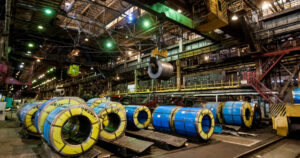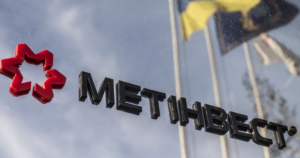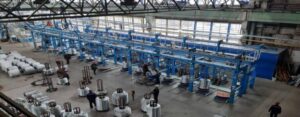
Dangerous weather conditions in the form of strong winds and thunderstorms are expected in Ukraine on Sunday, according to the Ukrainian Hydrometeorological Center.
“On May 4, during the day, thunderstorms are expected in the northern, Vinnytsia, and Cherkasy regions, and in Ukraine, except for the southeast, wind gusts of 15-20 m/s (I level of danger, yellow). Weather conditions may complicate the work of energy, construction, and utility companies and transport,” the report said.

Kyiv Radio Plant JSC, 50% of which is owned by the State Committee of Ukraine (SCU), will pay dividends to shareholders totaling UAH 285.6 thousand from May 14 to June 14 this year at the rate of UAH 0.001019 per share of UAH 0.25.
According to the publication in the disclosure system of the National Securities and Stock Market Commission (NSSMC), the relevant decision was made by the general meeting of shareholders on April 28, 2025.
The State Treasury owns 140 million 181 thousand 999 shares of the company, while the second shareholder, Sodruzhestvo-Progress PrJSC, owns two more shares. The authorized capital of Kyiv Radio Plant JSC is UAH 70.09 million.
The plant’s main specialization is the production of aircraft and spacecraft and related equipment. The company also designs and manufactures elevators.
According to Opendatabot, in 2024, the plant earned UAH 0.357 million in net profit (a year earlier – UAH 0.285 million), while net income decreased by 9% to UAH 162.3 million.
At the beginning of this year, the plant employed 115 people.

In January-April this year, Zaporizhzhia Iron and Steel Works “Zaporizhstal” increased its rolled steel output by 2.5% year-on-year to 865.7 thousand tons from 844.8 thousand tons.
According to the company’s press release on Thursday, steel production for the period amounted to 1 million 18.9 thousand tons (1 million 9.3 thousand tons in January-April 2024), and pig iron production amounted to 1 million 132.4 thousand tons (1 million 50.4 thousand tons).
In April, Zaporizhstal produced 282.8 thousand tons of iron, 270.6 thousand tons of steel, and shipped 228.3 thousand tons of rolled products.
As reported, in 2024, Zaporizhstal increased its rolled steel output by 18.1% compared to 2023 – to 2 million 426.7 thousand tons from 2 million 54.7 thousand tons, steel – by 17.2% to 2 million 890.8 thousand tons, pig iron – by 14.2% to 3 million 106.3 thousand tons.
“In 2023, Zaporizhstal increased its rolled steel output by 57.2% compared to 2022, to 2 million 54.7 thousand tons, steel by 65.4%, to 2 million 466.9 thousand tons, and pig iron by 35.3%, to 2 million 718.9 thousand tons.
“Zaporizhstal is one of the largest industrial enterprises in Ukraine, whose products are in great demand among consumers both in the domestic market and in many countries of the world.
“Zaporizhstal is in the process of integration into Metinvest Group, whose major shareholders are System Capital Management (71.24%) and Smart Holding Group (23.76%).
Metinvest Holding LLC is the management company of Metinvest Group.
Dynamics of export of goods in january-november 2024 by the most important items in relation to the same period of 2023, %


In January-March 2025, Metinvest Mining and Metallurgical Group, including its associates and joint ventures, increased its payments to the budgets of all levels in Ukraine by 4% compared to the same period in 2024, to UAH 4.4 billion.
According to the company’s press release on Thursday, the top three largest payments were subsoil use fees (UAH 1.2 billion), a single social contribution (UAH 846 million), and personal income tax (UAH 751 million).
In addition, in January-March 2025, Metinvest’s Ukrainian enterprises paid UAH 365 million in income tax and UAH 166 million in environmental tax. At the same time, land payments increased by 9% year-on-year to UAH 339 million, and military duty more than tripled to UAH 214 million.
“When every hryvnia is important for the front and the rear, responsible business becomes a real pillar of the country. Taxes are not just numbers, but real resources for the army, healthcare and social programs. Stable deductions, assistance to the Armed Forces, steel production for the front line, and humanitarian projects are our contribution to the country’s resilience. We will continue to work to support the state now and build its future together,” said Yuriy Ryzhenkov, CEO of the group.
As reported earlier, in 2024, Metinvest paid UAH 19.8 billion in taxes and fees to the budgets of all levels in Ukraine.
“Metinvest is a vertically integrated group of steel and mining companies. Its businesses are located in Ukraine, in Donetsk, Luhansk, Zaporizhzhia and Dnipro regions, as well as in the European Union, the United Kingdom and the United States.
The main shareholders of the holding are SCM Group (71.24%) and Smart Holding (23.76%). Metinvest Holding LLC is the management company of Metinvest Group.

Dneprometiz-TAS LLC (Dnipro), owned by Ukrainian businessman Sergiy Tigipko, increased its net profit by 47.7% in 2024 compared to 2023, to UAH 14.197 million from UAH 9.610 million.
According to the company’s annual report, net income increased by 22.7% to UAH 3 billion 285.688 million in the period under review.
At the same time, the company’s retained earnings amounted to UAH 263.048 million at the end of 2024.
As reported earlier, Dneprometiz reduced its net profit by 2.6 times in 2023 compared to 2022, to UAH 9.658 million from UAH 24.733 million. Last year, net income increased by 8.2% to UAH 2 billion 677.836 million.
“In 2022, Dneprometiz reduced its net profit six times year-on-year to UAH 25.572 million, while net income increased by 1.1% to UAH 2 billion 474.397 million.
“Dneprometiz-TAS produces hardware products from low-carbon steels. The company’s annual production capacity is 120 thousand tons.
The company is owned by T.A.S. Overseas Investments Limited (Cyprus) owns 98.6578 percent of Dneprometiz LLC.
The authorized capital of Dneprometiz-TAS LLC is UAH 83.480 million.